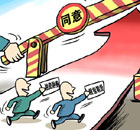-
-
China Daily E-paper
Li Xing
Will couplets be a thing of the past for our children?
By Li Xing (China Daily)
Updated: 2010-02-11 07:08
 |
Large Medium Small |
Sunday is the lunar new year. Red lanterns are raised, giant posters with the word fu - meaning happiness - are posted, and extended families gather to feast, accompanied by crescendos of firecrackers. These are just a few of the rituals that have been revived, after being banned during the 10 years of the "cultural revolution". Nor was that the first time traditional lunar new year celebrations were suppressed.
After the Qing Dynasty was overthrown, China gave up its lunar calendar and adopted the Western Gregorian calendar. In January 1914, president Yuan Shikai signed a document renaming the lunar new year "Spring Festival".
Again in the early 1930s, the Kuomintang government tried to abolish the dual New Year's celebrations, but failed. The name "Spring Festival" has endured.
Another New Year's ritual that has returned after the "cultural revolution" is the doling out of "red envelopes" by family elders and the distribution of gifts to friends and family, as described by Qing Dynasty writer Cao Xueqin in A Dream of Red Mansions. Inevitably, people worry that some children get more than their fair share of these "red envelopes", sometimes containing thousands or even tens of thousands of yuan.
Every year, before the family dinner on New Year's Eve, my cousins in Hubei province go to the cemetery to pay their respects to their ancestors.
This, of course, is the most important ritual of the lunar new year. Yet sadly, many of us in urban areas no longer observe it, because we live far away from our ancestral homes.
Another New Year's tradition is writing duilian, couplets that express our aspirations for the New Year. Many couplets are available online or in supermarkets, but very few are true to tradition.
In fact, few of us today are able to create proper duilian. We are handicapped because we don't have enough classical Chinese vocabulary to come up with two lines with words corresponding in their metrical length.
Nor do we have enough knowledge of classical Chinese literature to come up with characters that share the same (or almost the same) tone or meaning.
After 30 years of prosperity, many people worry that we are losing our cultural heritage, including the Chinese language.
Just recently, four universities in Shanghai chose not to include Chinese language as part of the pre-enrollment test for elite high school graduates.
Two years ago, Pan Wenguo, a language professor at East China Normal University, published a book, Chinese Language in Crisis, in which he cited numerous examples of the alarming decay of the Chinese language.
According to Pan, critics found more than 400 errors in grammar and expression, as well as misuse of proverbs, in the memoir of a well-known broadcaster.
The quality of Chinese teaching is deteriorating in schools, with classical Chinese accounting for a pathetic percentage of class hours. In 2005, a group of foreign students studying at Shanghai's Fudan University beat the home team in a contest that tested the students' basic knowledge of Chinese characters, structure, pronunciation, and proverbs.
Worst of all, Pan points out, Chinese is being "contaminated", as names of shops, hotels, and even residential areas contain words directly translated from foreign languages, such as the Sibote (Sport) Hotel in Shanghai. An upscale in the neighborhood of my home is Luoma (Roman) Garden.
These examples may seem trivial, even amusing, in themselves. But we must not underestimate the damage such contamination can do to our language and our culture.
As we look forward to the New Year, we should also look back and cherish aspects of our 5,000-year history, such as the Chinese language. Otherwise, New Year's couplets may become a thing of the past.
E-mail: lixing@chinadaily.com.cn
(China Daily 02/11/2010 page9)









